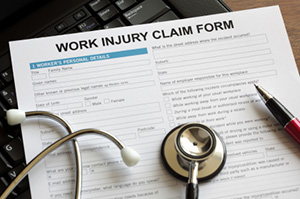PA Workers’ Compensation Payment Questions

What types of payments can you receive from workers’ compensation?
You may be eligible to receive workers’ compensation benefits if a doctor orders you off of work for more than 7 days. In order to be paid for your first 7 days of missed work, you need to be off of work and under a doctor’s care for at least 14 consecutive work days.
If your workers’ compensation claim is approved, you may be eligible to receive the following benefits:
- Medical Benefits – Doctor visits, surgery, hospital expenses, prescription drugs and other medications, orthopedic devices and medical supplies are covered. Also, it is important to understand that you do not have to miss any work to receive Pennsylvania workers’ compensation benefits for your medical expenses – they are considered separate from lost wages payments and other workers’ compensation benefits.
- Total Disability Benefits (lost wages) – Pennsylvania workers’ compensation law allows you to collect a portion of your gross weekly wages up to a maximum amount if you are unable to work at all due to your work-related injury or illness. The amount you receive is based on the amount you make per week (on average).
- Partial Disability Benefits (lost wages) – You may receive partial disability benefits if you return to a modified or light-duty job that pays less than the job you did before you were injured.
- Specific Loss Benefits – A specific loss benefit is paid in one lump sum, and may result from amputation, dismemberment, or permanent loss of use of a finger, thumb, hand, arm, toe, foot, leg, eye, or ear. The amount of the specific loss benefit depends on a number of factors, including the area and extent of the amputation or permanent loss of use, as well as the number of weeks you missed work due to the injury.
- Scarring – You may compensated for a scar or burn that is located on your head, face, or neck; the result of an accident at work; or the result of surgery necessary to treat your injury from an accident at work.
- Lump sum settlement – If you have been off work for more than 4 months due to a work-related injury and currently receiving benefits, you may be able to settle with the insurance company for a lump sum. A lump sum settlement is a one-time payment that you can accept for both your lost wages and medical expenses.
- Death Benefits – If a work injury or illness results in death, the surviving family members who were dependent on the deceased worker’s income may be eligible to receive a death benefit payment from Pennsylvania workers’ compensation. The amount of the death benefit payment will depend upon the relationship to the deceased worker.
When should you receive your payment from workers’ compensation?
You should receive your first check approximately 21 days following the date you notified your employer about your injury.
How much will you get paid for lost wages?
In Pennsylvania, payments for lost wages are approximately 2/3 of your average weekly wage (up to a pre-set maximum).
In addition, it is also possible for wage loss benefits to be reduced if you are receiving other payments (such as a pension).
When are you in danger of losing your workers’ compensation benefits?
You can lose your workers’ compensation payments if you:
- Refuse to submit to reasonable medical services.
- Refuse to comply with an order to have a medical exam.
- Are convicted of a crime and are put in jail.
- Fail to complete and return an employee verification form to the workers’ compensation insurance company within 30 days
Your lost wage payments can also be stopped or modified if:
- A judge appointed to review the facts of your workers’ compensation claim decides to stop or modify your lost wage payments.
- You have fully recovered from your injury and have signed a “Final Receipt” agreeing to stop your benefits.
- Your doctor orders you to a modified or light-duty position, you may still be able to collect partial disability payments if the job pays less than what you made before your injury.
- You agree to receive a lump sum of money, also known as a “Compromise and Release.”
- You return to work and are making the same, or more than, you made before your work-related injury or illness.
- You die from causes unrelated to your work injury.
How will you know if your employer has filed a petition to change your workers’ compensation benefits?
You should receive notice that your employer intends to change your workers’ compensation benefits in some capacity. Your employer must file a “Petition to Terminate, Modify, or Suspend Benefits.” For example, your employer may file a “Petition to Terminate Compensation Benefits” if it believes that you have recovered from your injury and can return to work. A workers’ compensation judge will decide to stop or modify your workers’ compensation benefits, and until those hearings take place, you should still receive your benefits and payments.
What happens to your workers’ compensation payments if the doctor releases you to light-duty work?
If you return to work and you make:
- The same amount of money (or more money) than what you made before you were hurt, your payment for lost wages will be suspended.
- Less money than you made before you were hurt, you will receive lost wage payments in the form of partial disability benefits.
If your doctor releases you to light-duty work but your employer does not have a light-duty job available, you can continue to receive your benefits. If your employer has a light-duty job available for you, the job duties would have to be approved by your doctor.
Even after you return to your job, workers’ compensation will continue to pay any reasonable and necessary medical expenses related to your work injury or illness. In addition, your workers’ compensation payments may start again if your doctor takes you off work again while you are on modified or light-duty work.
If have additional questions regarding workers’ compensation payment, contact us to schedule a free consultation, or call us, toll-free, at (855) 589-9458.


